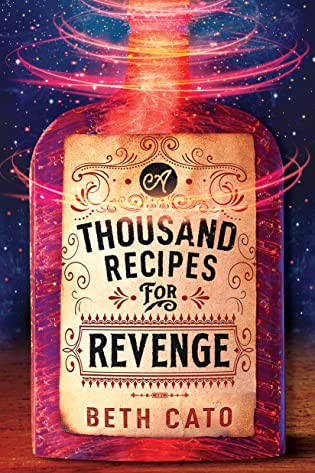 A Thousand Recipes for Revenge by Beth Cato
A Thousand Recipes for Revenge by Beth Cato Format: eARC
Source: supplied by publisher via NetGalley
Formats available: paperback, ebook, audiobook
Genres: epic fantasy, fantasy, historical fantasy
Series: Chefs of the Five Gods #1
Pages: 411
Published by 47North on June 13, 2023
Purchasing Info: Author's Website, Publisher's Website, Amazon, Barnes & Noble, Bookshop.org, Better World Books
Goodreads
A world on the brink of war and a mother and daughter on the run, in a thrilling novel of swashbuckling adventure, culinary magic, and just desserts.
Adamantine “Ada” Garland has an empathic connection to food and wine, a magical perception of aromas, flavors, and ingredients. Invaluable property of the royal court, Ada was in service to the Five Gods and to the Gods-ordained rulers of Verdania—until she had enough of injustice and bloodshed and deserted, seeking to chart her own destiny. When mysterious assassins ferret her out after sixteen years in hiding, Ada, now a rogue Chef, and her beloved Grand-mère run for their lives, only to find themselves on a path toward an unexpected ally.
A foreign princess in a strange court, Solenn unknowingly shares more with Ada than an epicurean gift. They share blood. With her newfound magical perception, she becomes aware of a plot to kill her fiancé, the prince. It’s part of a ploy by adversarial forces in the rival country of Albion to sow conflict, and Solenn is set up to take the blame.
As Ada’s and Solenn’s paths converge, a mother and her long-lost daughter reunite toward a common goal, and against a shadowy enemy from Ada’s past who is out for revenge. But what sacrifices must be made? What hope is there when powerful Gods pick sides in a war simmering to eruption?
My Review:
There are a thousand quotes about revenge and most of them are not kind to the person seeking it. But it’s possible that the one in the world of these particular five gods is the most bitter, literally and figuratively. “There are a thousand recipes for revenge, and they all taste like scat.”
In other words, revenge tastes like shit. In a world where the ability to perceive and even enhance the qualities of every single thing a person might eat or drink is the highest form of magic, that has to be one of its world’s greatest curses.
And a warning that entirely too many people have refused to heed in this fantastic story that has only just begun.
At first, we’re following two women who don’t seem to have much to do with each other. And even though we don’t know it yet, someone’s revenge has reached out, seemingly from beyond the grave, to do its best to turn both their lives into shit.
Or perhaps something a bit worse but surprisingly edible – even if it really, really shouldn’t be. Which is where this world’s magic comes in.
Ada Garland is one of the chefs blessed by Gyst, the God of Mysteries and Unknowns. Her tongue is literally magic. She can tell whether something is clean or polluted, poisonous or just badly prepared, too salty, too sweet, or perfectly balanced. Her magic allows her to make the dish that a person wants and needs most in that moment – and do it perfectly every time.
And she has the power to turn certain special ingredients, called epicurea, into magical items that will pass their magic on to whoever eats them.
It’s a gift and a curse at the same time, as all blessed chefs in her country are automatically conscripted into the royal service the moment their talents manifest. It’s a service that led Ada to her husband and their child. And it’s a service that split them apart when the alliance between their countries dissolved.
Ada is on the run, and has been for over a decade, taking care of her increasingly unstable grandmother while avoiding the grasping, greedy mother who wants to use her and her talent for ends that are even more unsavory than Ada first believed.
The revenge that reaches out for Ada, her friends and her family threatens to expose all of her secrets – and theirs. If it doesn’t get them all killed first. Or worse. Much, much worse.
 Escape Rating A+: I picked this up because I was looking for something else with magical cookery after The Nameless Restaurant. Both stories do feature cookery as Magic with a Capital “M”, but that is the only thing they have in common. I’m still grateful for the push from the one to the other, because A Thousand Recipes for Revenge is just plain awesome and I’m so glad I read it, even if it is making me give the side-eye to pretty much everything I eat.
Escape Rating A+: I picked this up because I was looking for something else with magical cookery after The Nameless Restaurant. Both stories do feature cookery as Magic with a Capital “M”, but that is the only thing they have in common. I’m still grateful for the push from the one to the other, because A Thousand Recipes for Revenge is just plain awesome and I’m so glad I read it, even if it is making me give the side-eye to pretty much everything I eat.
The magic system here is both fascinating and unsettling at the same time, because it’s all wrapped around magical foods, the ability to create them and the ability to taste them. This is a world where many people can cook, and unsurprisingly so or everyone would starve, but where it takes a gift from the actual gods to be a chef. But the silver lining of that gift comes with plenty of cloud wrapped around it, as both Ada and Princess Solenn discover to their cost.
This is also definitely one of those stories about being better off – or at least sleeping better at night – if one did not know how the sausage was made. It’s a secret that has been brutally suppressed in this world for excellent if entirely terrible reasons.
At first, this seems like a rather typical military type, gaslamp set fantasy. Ada is AWOL from her military service, while our second perspective on this story, Princess Solenn, is in the midst of being married off for a political alliance.
But then Ada’s old comrades start getting killed, Ada’s hidden existence is suddenly under threat, and it seems like she’s on the run from awful but otherwise mundane forces. Until things go completely pear-shaped and the gods start getting involved. At which point it’s off to the races – against time, against death, against the forces of oppression and most especially against petulant beings who would rather play with their food than either nurture it, treat it as a pet or kill it as prey.
And then things get really complicated.
I thought I knew where this was going. And then I thought I knew where this was going. But it didn’t go any of the places I thought it would, but where it did end up was both head spinning and stomach churning as well as a tremendous tease because there had to be more and at first I didn’t realize there was, but there is and oh thank goodness!
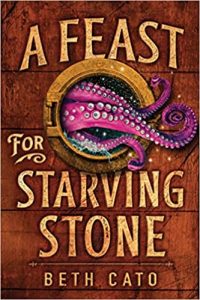 Ada and Solenn give readers two heroines to route for, as this is both Ada’s story of picking up the pieces of the life she left behind and Solenn’s coming of age story and both are fantastic. The world’s setup at first seems fairly standard epic fantasy and then goes to places that are fresh (if occasionally rotting) and new and unexpected. There are bits of Bujold’s World of the Five Gods and Jenn Lyons’ A Chorus of Dragons in the way that the gods of this world operate, as well as Guy Gavriel Kay’s and Jacqueline Carey‘s use of real world geography and history as a way of creating a fantasy world’s map and political divisions, but the magic system is just completely off a new wall and it’s marvelous in the way it suffuses the story.
Ada and Solenn give readers two heroines to route for, as this is both Ada’s story of picking up the pieces of the life she left behind and Solenn’s coming of age story and both are fantastic. The world’s setup at first seems fairly standard epic fantasy and then goes to places that are fresh (if occasionally rotting) and new and unexpected. There are bits of Bujold’s World of the Five Gods and Jenn Lyons’ A Chorus of Dragons in the way that the gods of this world operate, as well as Guy Gavriel Kay’s and Jacqueline Carey‘s use of real world geography and history as a way of creating a fantasy world’s map and political divisions, but the magic system is just completely off a new wall and it’s marvelous in the way it suffuses the story.
Which, as I squeed earlier, thankfully isn’t done yet. There’s a second book in the Chefs of the Five Gods series, A Feast for Starving Stone, coming in January. And I can’t wait!

 The Benevolent Society of Ill-Mannered Ladies (The Ill-Mannered Ladies, #1) by
The Benevolent Society of Ill-Mannered Ladies (The Ill-Mannered Ladies, #1) by 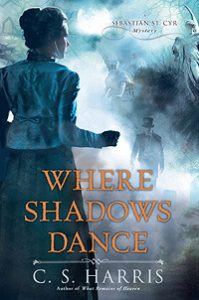 Both the Colebrook sisters and St. Cyr are conducting their investigations during the Regency period, in this book specifically 1812 – which is also the year in which books 4 through 8 of the St. Cyr series (
Both the Colebrook sisters and St. Cyr are conducting their investigations during the Regency period, in this book specifically 1812 – which is also the year in which books 4 through 8 of the St. Cyr series (



 Current Giveaways:
Current Giveaways: Blog Recap:
Blog Recap: Coming This Week:
Coming This Week:












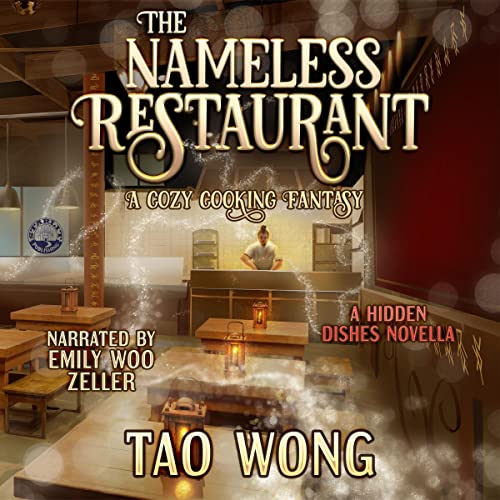 The Nameless Restaurant (Hidden Dishes: Book #1) by
The Nameless Restaurant (Hidden Dishes: Book #1) by 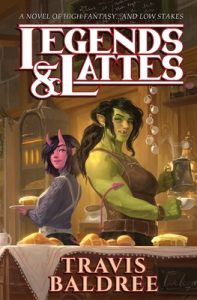 Escape Rating A-: Anyone who loved Travis Baldree’s
Escape Rating A-: Anyone who loved Travis Baldree’s 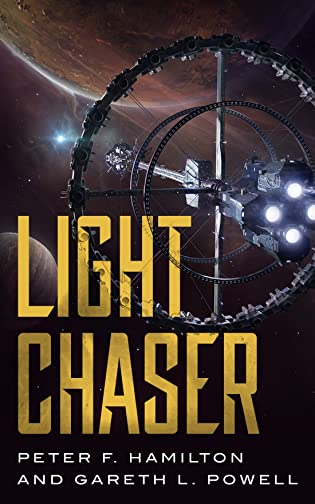 Light Chaser by
Light Chaser by  Red Team Blues (Martin Hench) by
Red Team Blues (Martin Hench) by  Dear Chrysanthemums: A Novel in Stories by
Dear Chrysanthemums: A Novel in Stories by 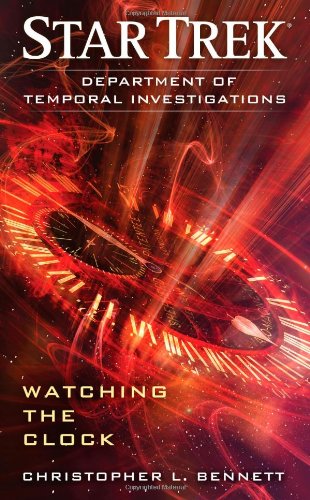 Watching the Clock (Star Trek: Department of Temporal Investigations #1) by
Watching the Clock (Star Trek: Department of Temporal Investigations #1) by  Which sounds a lot like what the Borg were attempting in
Which sounds a lot like what the Borg were attempting in